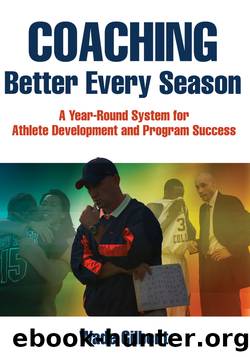Coaching Better Every Season by Wade Gilbert

Author:Wade Gilbert [Wade Gilbert]
Language: eng
Format: epub
ISBN: 9781492507666
Publisher: Human Kinetics
Published: 2017-01-15T00:00:00+00:00
This chapter presents proven strategies and effective actions for coaching during competitions. Keep in mind, however, that all these measures require coaches to keep their wits about them and keep their emotions in check in the heat of battle. Such self-control is essential to fulfill the role as coach and leader during these events.
Bench Coaching
A common mistake made by many coaches, from youth all the way to Olympic level, is overcoaching during competitions.3, 4 Spend enough time around competitive sport and you will undoubtedly encounter the puppet master coach. You know the coachâthe one who is constantly hollering and gesturing at the athletes as they are trying to perform or learn a skill. Overcoaching occurs when coaches give too much instruction or excessive feedback during competitions. This approach ultimately overwhelms athletes because it distracts them from focusing on their performance.
In competitions, coaches should trust their athletes and give them enough freedom to perform what they taught them in practices. As five-time NBA championship coach Gregg Popovich noted late in his career, âIâve learned to shut up more. Sometimes being quiet and letting the player play is much more important than trying to be Mr. Coach and teach him this or teach him that.â5
Research on coach behaviors during competitions supports what Coach Popovich has learned through experience.6â9 For example, coaches who guided athletes to Olympic or Paralympic medals intervened during major competitions only if they thought doing so was absolutely necessary.6 Attempts to coach athletes during the competition were rare. Ice hockey coach Ken Hitchcock, who has guided teams to Olympic, world, and professional championships, is a prime example. When working with other coaches he often reminds them, âGames are [the playersâ time]; practice is my time.â10 (p. 22)
Although championship coaches generally take a less is more approach to coaching during competitions, they are not passive observers throughout the competition. On the contrary, the best coaches take an active role in guiding and supporting their athletes during competitions. Three components define an effective approach to competition coaching: examine, encourage, and educate (see table 9.1).
Download
This site does not store any files on its server. We only index and link to content provided by other sites. Please contact the content providers to delete copyright contents if any and email us, we'll remove relevant links or contents immediately.
Machine Learning at Scale with H2O by Gregory Keys | David Whiting(4289)
Never by Ken Follett(3930)
Liar's Poker by Michael Lewis(3437)
The Ultimate Backcountry Survival Manual by Aram Von Benedikt; Editors of Outdoor Life;(3255)
Will by Will Smith(2901)
The Partner by John Grisham(2393)
Can't Hurt Me: Master Your Mind and Defy the Odds - Clean Edition by David Goggins(2319)
Friends, Lovers, and the Big Terrible Thing by Matthew Perry(2211)
Taste by Kris Bryant(1857)
HBR's 10 Must Reads 2022 by Harvard Business Review(1832)
A Short History of War by Jeremy Black(1831)
A Game of Thrones (The Illustrated Edition) by George R. R. Martin(1707)
Never Finished: Unshackle Your Mind and Win the War Within by David Goggins(1694)
515945210 by Unknown(1660)
The Arm by Jeff Passan(1604)
Why We Love Baseball by Joe Posnanski(1592)
443319537 by Unknown(1541)
The Dodgers by Schiavone Michael;(1527)
The Yogi Book by Yogi Berra(1520)
